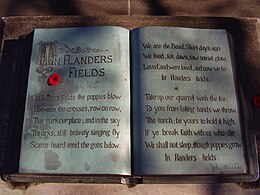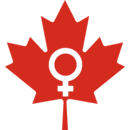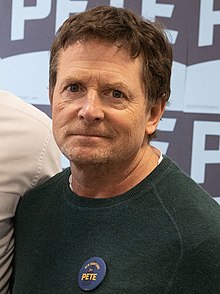Portal:Canada
| Showcase | Contents | Contributing |
Introduction
Canada is a country in North America. Its ten provinces and three territories extend from the Atlantic Ocean to the Pacific Ocean and northward into the Arctic Ocean, making it the world's second-largest country by total area, with the world's longest coastline. Its border with the United States is the world's longest international land border. The country is characterized by a wide range of both meteorologic and geological regions. With a population of just over 41 million people, it has widely varying population densities, with the majority residing in urban areas and large areas of the country being sparsely populated. Canada's capital is Ottawa and its three largest metropolitan areas are Toronto, Montreal, and Vancouver.
Canada is a parliamentary democracy and a constitutional monarchy in the Westminster tradition. The country's head of government is the prime minister, who holds office by virtue of their ability to command the confidence of the elected House of Commons and is appointed by the governor general, representing the monarch of Canada, the ceremonial head of state. The country is a Commonwealth realm and is officially bilingual (English and French) in the federal jurisdiction. It is very highly ranked in international measurements of government transparency, quality of life, economic competitiveness, innovation, education and human rights. It is one of the world's most ethnically diverse and multicultural nations, the product of large-scale immigration. Canada's long and complex relationship with the United States has had a significant impact on its history, economy, and culture.
A developed country, Canada has a high nominal per capita income globally and its advanced economy ranks among the largest in the world, relying chiefly upon its abundant natural resources and well-developed international trade networks. Recognized as a middle power, Canada's strong support for multilateralism and internationalism has been closely related to its foreign relations policies of peacekeeping and aid for developing countries. Canada is part of multiple international organizations and forums. (Full article...)
Featured article -

"In Flanders Fields" is a war poem in the form of a rondeau, written during the First World War by Canadian physician Lieutenant-Colonel John McCrae. He was inspired to write it on May 3, 1915, after presiding over the funeral of friend and fellow soldier Lieutenant Alexis Helmer, who died in the Second Battle of Ypres. According to legend, fellow soldiers retrieved the poem after McCrae, initially dissatisfied with his work, discarded it. "In Flanders Fields" was first published on December 8 of that year in the London magazine Punch. Flanders Fields is a common English name of the World War I battlefields in Belgium and France. (Full article...)
Featured biography -
Michael Andrew Fox OC (born June 9, 1961), known professionally as Michael J. Fox, is a Canadian and American activist and retired actor. Beginning his career as a child actor in the 1970s, he rose to prominence portraying Alex P. Keaton on the NBC sitcom Family Ties (1982–1989) and Marty McFly in the Back to the Future film trilogy (1985–1990). Fox went on to star in films such as Teen Wolf (1985), The Secret of My Success (1987), Casualties of War (1989), Doc Hollywood (1991), and The Frighteners (1996). He returned to television on the ABC sitcom Spin City in the lead role of Mike Flaherty (1996–2000). (Full article...)
Selected panorama -
National symbol -
Lacrosse is a contact team sport played with a lacrosse stick and a lacrosse ball. It is the oldest organized sport in North America, with its origins with the indigenous people of North America as early as the 12th century. The game was extensively modified by European colonists, reducing the violence, to create its current collegiate and professional form. (Full article...)
Selected vital article -

The History of women in Canada is the study of the historical experiences of women living in Canada and the laws and legislation affecting Canadian women. In colonial period of Canadian history, Indigenous women's roles were often challenged by Christian missionaries, and their marriages to European fur traders often brought their communities into greater contact with the outside world. Throughout the colonial period, European women were encouraged to immigrate to Canadian colonies and expand the white population. After Confederation in 1867, women's experiences were shaped by federal laws and by legislation passed in Canada's provincial legislatures. (Full article...)
Selected picture -
Current events
- November 15, 2024 –
- The Canadian Union of Postal Workers go on strike after failing to renegotiate their contract with Canada Post. (AP)
- October 25, 2024 –
- A man fatally shoots two of his family members before killing himself in Huntsville, Ontario, Canada. (CTV News Barrie)
- Ontario Premier Doug Ford's government announces that Ontario is planning to ban international students from medical schools in the province beginning in 2026. (Pelham Today)
- October 24, 2024 –
- Four people are killed and one other is seriously injured when a Tesla car crashes into a guardrail and struck a concrete pillar at high speed after losing control causing a fire in Toronto, Canada. (CTV News Toronto)
- October 15, 2024 –
- The Palestinian Prisoner Solidarity Network is designated as a terrorist group by the Canadian government and is sanctioned by the U.S. government, due to the group's alleged ties to the Popular Front for the Liberation of Palestine. (CTV News)
- October 10, 2024 – Russian invasion of Ukraine
- The World Bank approves a new financial intermediary fund consisting of grants from the United States, Japan, Canada, and other countries coupled with interest from frozen Russian assets to give to Ukraine as part of a $50 billion loan. (Reuters)
Did you know -

- ... that the now-destroyed statue of Alexander Wood was the first LGBT monument in Canada?
- ... that Saulteaux linguist Margaret Cote was the first person in Saskatchewan to teach a First Nations language in a public school?
- ... that Canadian peacekeepers participated in every UN peacekeeping effort from its inception until 1989?
- ... that Carrie Jenkins Harris, the North American writer who died in 1903, should not be confused with Carrie Jenkins Harris, the North American writer and editor who died in 1903?
- ... that Canadian punk rock musician Talli Osborne had only briefly spoken to the frontman of NOFX before the band wrote a song about her?
- ... that Canadian running back Chase Brown ranked second in American college football with 1,643 rushing yards in 2022?
- ... that Inuvialuk actress Marika Sila views her acting career as a platform for outreach and education on the culture and rights of Indigenous peoples in Canada?
Featured list -
Like most major cities, Montreal needs easy highway access from its suburbs and surrounding areas. However, because Montreal was built on an island surrounded by three rivers, it can be entered by land only on a bridge or through a tunnel. Although the city was founded in 1642, it was not until 1847 that the first fixed link to the outside was established when a wooden bridge was built across Rivière des Prairies to Île Jésus, on the site of what is now Ahuntsic Bridge. Another bridge was built immediately afterward, a few kilometers west, which became Lachapelle Bridge, and another in 1849, Pont des Saints-Anges, to the east. The latter bridge collapsed in the 1880s and was never rebuilt. (Full article...)
Main articles
Associated Wikimedia
The following Wikimedia Foundation sister projects provide more on this subject:
-
Commons
Free media repository -
Wikibooks
Free textbooks and manuals -
Wikidata
Free knowledge base -
Wikinews
Free-content news -
Wikiquote
Collection of quotations -
Wikisource
Free-content library -
Wikiversity
Free learning tools -
Wikivoyage
Free travel guide -
Wiktionary
Dictionary and thesaurus































